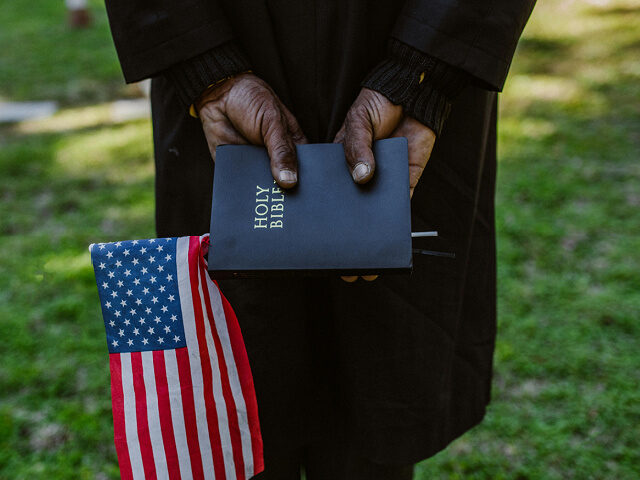President Donald Trump praised the Internal Revenue Service (IRS) for its decision to allow churches to endorse political candidates, stating he loves “that churches can now make political endorsements."
When asked by a reporter on Wednesday what his “reaction” was to the IRS’s decision, Trump explained that his administration has “a lot of respect for the people that lead the church.” Trump added that “if somebody of faith wants to make a political endorsement, it is something he would 'like to hear.”
Be informed, not misled.
“The IRS says that churches can now endorse political candidates,” the reporter said. “What’s your reaction to this, and how do you expect this to influence some of the work that’s afoot on the continent? There’s a lot of American churches that are doing missionary work on the continent. Do you support that?”
“I love the fact that churches can endorse a political candidate,” Trump answered. “I think so, because we have a lot of respect for the people that lead the church — the pastors, and the ministers, and the rabbis, and all different leaders, all different religions, and people respect those people, and I think there’s nothing wrong.”
Trump continued to explain that under the Johnson Amendment, churches faced a “very big penalty” for making political endorsements of candidates.
About the Johnson Amendment
Averaging just over 200 in Sunday worship, First Baptist Church draws a 10th of Waskom, Texas,—population 2,000—to its sanctuary when it praises the Lord each Sunday.
However, the small-town Southern Baptist Church wields a big stick, effectively challenging what it called an unequal application of the 71-year-old Johnson Amendment, which prevents political comments from pulpits across the nation.
The church was among four plaintiffs in a lawsuit against the Internal Revenue Service that ended July 7 with a binding consent judgment “enjoining the Defendants as well as their successors, agents, and employees, from enforcing the Johnson Amendment against Plaintiff Churches based on speech by a house of worship to its congregation in connection with religious services through its customary channels of communication on matters of faith, concerning electoral politics viewed through the lens of religious faith.”
The Johnson Amendment, as it formerly restricted political comments from the pulpit, is null and void.
The National Religious Broadcasters, Sand Springs Church of Athens, Texas, and Intercessors for America were also plaintiffs in the lawsuit filed August 28, 2024, against the IRS and its Commissioner Billy Long in U.S. District Court in the Eastern District of Texas.
The consent judgment allows churches not only to address congregations from the pulpit “when their religious beliefs compel them to take a position on electoral politics,” but also to address congregations through customary communication channels including published or distributed statements. In doing so, churches “neither ‘participate(s)’ nor ‘intervene (s)’ in a ‘political campaign,’ within the ordinary meaning of those words. To ‘participate’ in a political campaign is ‘to take part’ in the political campaign, and to ‘intervene’ in a political campaign is ‘to interfere with the outcome or course’ of the political campaign,’ reads the consent that permanently enjoins the defendants.
The Johnson Amendment, the plaintiffs said in their original complaint, violated their First Amendment rights to free speech and free exercise of religion, their Fifth Amendment rights to due process of law and equal protection under the law, and the Religious Freedom Restoration Act.
The nay-sayers to this current judgment claim there may be abuses. Well, there are abuses of any law or judgment.
The consequences of the judgment.
Pastors who have claimed they didn't speak to the culture from the pulpit because of the Johnson Amendment are now free to do so. Those who merely use the Johnson Amendment as an excuse not to speak on the issues will need to search their own hearts.
Presbyterian pastor and educator Rev. Charles Finney said, "If there is a decay of conscience, the pulpit is responsible for it. If the public press lacks moral discernment, the pulpit is responsible for it. If the church is degenerate and worldly, the pulpit is responsible for it. If the world loses its interest in Christianity, the pulpit is responsible for it. If Satan rules in our halls of legislation, the pulpit is responsible for it. If our politics become so corrupt that the very foundations of our government are ready to fall away, the pulpit is responsible for it."
He also said, "The Church must take right ground in regard to politics... Politics are a part of a religion in such a country as this, and Christians must do their duty to the country as part of their duty to God... God will bless or curse this nation, according to the course Christians take in politics."
Takeaway
The Rev. Finney also said this: "If the presence of God is in the church, the church will draw the world in. If the presence of God is not in the church, the world will draw the church out."
The next time you drive by a church building draped with "trans" and LGBTQIA+ flags and banners, you can know the presence of God is not drawing anyone into that church.
Be Informed. Be Discerning. Be Vigilant. Be Engaged. Be Faithful. Be Prayerful.


